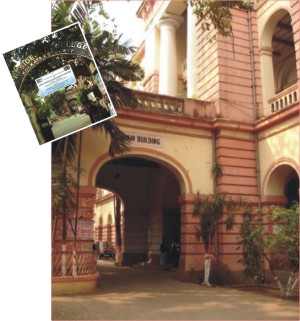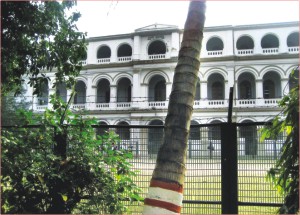Feature
Presidency College:
Glorious past hangs in the air!
Nazia Ahmed
 After an interesting journey through the Metro down to Mahatma Gandhi road, The dingy narrow road led us to Ramkamal Road surrounding with the hustle and bustle of passersby kept moving on in a monotonous pace. After an interesting journey through the Metro down to Mahatma Gandhi road, The dingy narrow road led us to Ramkamal Road surrounding with the hustle and bustle of passersby kept moving on in a monotonous pace.
College Street reminded us of our good old Nilkhet around the DU Campus with mighty huge heaps of books all over the roadside. Upon entering the campus the huge fields where the boys were playing cricket caught our eyes. The campus has a historic feel to it. Me and my colleague went up to find out more about the one and only Presidency College in West Bengal, in Kolkata to be exact.
It took us quite a while and a whole lot of climbing up and down to find Mr. Abhijit Datta. Through a brief tete e tete with Mr Datta, we found out some interesting facts about this historical institution.
Star Campus (SC): Presidency College is a renowned college in the sub continent and we have been hearing about it since our childhood. Tell us a little bit about its history and how it all started.
Mr. Datta: Presidency College and its academic excellence is intimately entwined with the intellectual history of Bengal and India. The foundation of the Hindu College in 1817 has had far reaching effects on the social and cultural history of the country. The college was renamed as Presidency College and brought under the direct control of the Government in 1855. The college was founded with the expressed intention of providing modern education to the Indian students. Though originally meant for the boys of the Hindu elite, the college was thrown open to all communities after 1855. The liberal, secular, scientific spirit that marked the advent of Indian modernity was born in this college. The classes were held at first in a rented house belonging to Gorachand Boshak at Garanhatta (later numbered 304 Chitpore Road). In January 1818 the Hindu College moved to 'Feringhi Kamal Bose's house' located nearby. The building is a historic one because Raja Ram Mohan Ray inaugurated his Brahma Sabha here. From Chitpore, the Hindu College eventually shifted to Bowbazar and later to a building that now houses the Sanskrit College.
Increasing realization of the value of western education made the Hindu College a coveted destination of scholars from all over India. Pupils came from Patna, Assam, Vizagapatnam and by 1828 enrolment rose to 400. The obvious question, which was raised, was whether it would not be wiser for the government to establish a new 'English College' open to all classes and community and leave the Hindu College to its fate. Incidentally, facing financial problems, the Committee of Managers of the Hindu College had become dependant on subsidy from the government which, as expected, began to play a greater role in running the affairs of the College.
 On October 21, 1853, the Governor of Bengal suggested that "a new general college should be established at Calcutta by the government and designated 'The Presidency College' …….. the College should be open to all youths of every caste, class or creed…….". On October 21, 1853, the Governor of Bengal suggested that "a new general college should be established at Calcutta by the government and designated 'The Presidency College' …….. the College should be open to all youths of every caste, class or creed…….".
On June 15, 1855 the Presidency College was formally established. The new edifice was opened on March 31, 1874 by the then Lieutenant Governor Sir George Campbell in the presence of His Excellency the Viceroy of India. The finishing touch was given to the edifice by Babu Nuffer Chandra Pal Chaudhuri, who provided it with a turret clock, at a cost of nearly Rs. 5000.00 soon after its opening. Professor J. Sutcliffe was the Principal of the College when the new building was opened.
SC: Tell us about the Programs that the college offers and its affiliations.
Mr. Datta: Presidency College is affiliated with Calcutta University. As such we offer programs from Undergrad, post grads, PHD including research programs.
SC: Tell us about the different departments the college houses.
 Mr. Datta: Among the Arts departments we have Bengali, English, Hindi, History, Philosophy, Political and Sociology Department. The Science Departments contains Botany, Chemistry (including Biochemistry), Economics, Geography (including Environmental Science), Geology, Mathematics, Physics, Physiology, Statistics and Zoology department (including Molecular Biology). We strive for academic excellence and thus each department provides seminars attended by resource persons from all over the globe. There is also a long list of publications by our teachers each year. Among the other departments there is the College Library and Physical Education department. Mr. Datta: Among the Arts departments we have Bengali, English, Hindi, History, Philosophy, Political and Sociology Department. The Science Departments contains Botany, Chemistry (including Biochemistry), Economics, Geography (including Environmental Science), Geology, Mathematics, Physics, Physiology, Statistics and Zoology department (including Molecular Biology). We strive for academic excellence and thus each department provides seminars attended by resource persons from all over the globe. There is also a long list of publications by our teachers each year. Among the other departments there is the College Library and Physical Education department.
SC: Tell us about the libraries.
Mr. Datta: The biggest library that is the Arts Library contains more than 2,730 books. Even though accommodation facilities are insufficient for the growing number of students, we have digitized over 1500 old books, journals and materials. The science library houses over 1100 books. Other than these two, we have the Economics and Political Science library and Hindi library in the Campus.
SC: Tell us a bit about the student organizations and the college societies?
Mr. Datta: We have our Karmi Sanskritik Sangstha, College Cooperative society and Alumni Association. The student wings function excellently through their Drama, Debate and Film clubs/wings.
Our students actively participate in educational excursions and carry out its sole objective of understanding and interacting with the ecological biodiversities. There are also winter schools that provide laboratory and lecture based training for the students.
SC: How do you cater for international student recruitments?
Mr. Datta: Our government has become very lenient on this matter now and we are holding the admission tests for international students in the month of May and June.
SC: Presidency College and its graduates are well known all around the globe. Tell us about them.
Mr. Datta: We would be leaving out most if we were to name a few here. But from the top of my mind I would like to mention the names of Somnath Chatterji, Amartya Sen, Aparna Sen and Shumon Chattyapadhhay.
Each and every graduate flourished and made something big in this world. Many have hit the History. But there are so many of them that it is indeed hard to point out a few.
As we came out of the building we talked to some of the students, informal chitchatting outside their department.
 SC: How does being a Presidency student make you feel different from students of other colleges in the country? SC: How does being a Presidency student make you feel different from students of other colleges in the country?
Sumitra Acharya (Physics dept.): Well, firstly because of its renowned history, that always gives us a reason to feel proud about our college. I think we have learned to be independent and function as an independent person. This happened because our teachers never put any pressure on us. They are more like our friends. Their lenient approach and skillful teaching helped us to be the people we are now.
SC: How do you rate the campus facilities?
Subodh Mehra (Physiology dept.): Our hostel facilities are good. The libraries need more attention. But overall we are satisfied with our facilities.
It was the end of a memorable close encounter with the past, a past that hung in every brick, in every book, and hung in the air of that magnificent edifice called Presidency College. I am sure when some of our elderly readers will read this piece, memories will flood in to make them nostalgic. Many of them might have studied in that college or at least heard the stories from their parents. It was a trip worth taken.
| 